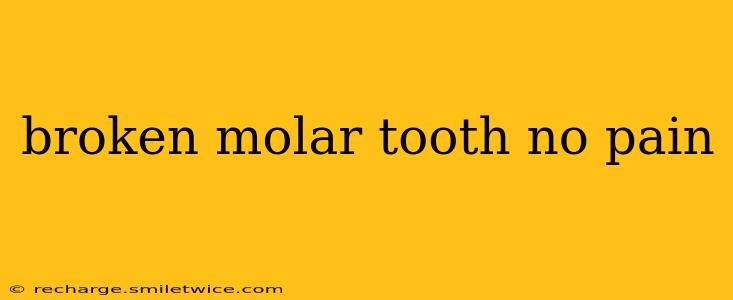A broken molar, even without pain, is a serious dental issue that demands immediate attention. While the absence of pain might seem reassuring, it often masks underlying problems that can lead to significant dental complications down the line. This article explores the reasons why a seemingly painless broken molar requires professional dental care and answers common questions surrounding this issue.
Why Does My Broken Molar Not Hurt?
The lack of immediate pain with a broken molar can be attributed to several factors. Nerve damage might have already occurred, rendering the tooth less sensitive. The break might be superficial, affecting only the enamel or dentin layers, which contain fewer nerve endings compared to the pulp (the inner part of the tooth containing nerves and blood vessels). Finally, inflammation or infection might not yet have progressed to a point where it causes noticeable pain. However, the absence of pain is not an indicator of the absence of a problem; ignoring it increases the risk of severe future complications.
What Should I Do if I Have a Broken Molar with No Pain?
Schedule an appointment with your dentist immediately. This is crucial, regardless of the absence of pain. Early intervention significantly improves the chances of saving the tooth and prevents more extensive and costly procedures later. Delaying treatment can lead to infection, the need for root canals, extractions, or even more serious health problems.
Can a Broken Molar Heal on Its Own?
No, a broken molar will not heal on its own. Unlike a small chip in the enamel, a fracture that penetrates deeper into the tooth requires professional intervention. The damaged portion won't repair itself, and leaving it untreated exposes the inner structures of the tooth to bacteria and potential infection.
What are the Long-Term Risks of Ignoring a Broken Molar?
Ignoring a broken molar, even if it's not painful, carries several significant long-term risks:
- Infection: Bacteria can easily enter the exposed area of the broken tooth, leading to an infection of the pulp (pulpitis) or the surrounding tissues (periodontitis). This can cause severe pain, swelling, and even spread to other areas of the body.
- Abscess: A dental abscess is a collection of pus caused by a bacterial infection. It's incredibly painful and requires immediate treatment to prevent further complications.
- Tooth Loss: If the infection is severe enough, the tooth might become unsalvageable and require extraction.
- Bone Loss: Severe infections can damage the bone supporting the tooth, leading to bone loss and potentially affecting neighboring teeth.
How is a Broken Molar Treated?
The treatment for a broken molar depends on the severity of the fracture and the extent of the damage. Possible treatment options include:
- Dental Bonding: For minor chips or cracks, bonding can repair the tooth's surface using a composite resin.
- Dental Crown: A crown is a cap that covers the entire tooth, protecting it from further damage and restoring its shape and function. This is often the treatment for more significant fractures.
- Root Canal: If the pulp is infected or damaged, a root canal might be necessary to remove the infected tissue and save the tooth.
- Extraction: In severe cases, where the tooth is extensively damaged or unsalvageable, extraction might be the only option.
My Broken Molar Hurts Sometimes – Is This Normal?
Intermittent pain indicates that the problem is progressing. Even occasional pain is a sign that the tooth requires immediate dental attention. Don't wait for consistent, severe pain; seek professional help as soon as possible.
What Happens if I Don't Get My Broken Molar Treated?
Failure to treat a broken molar can result in irreversible damage, including severe pain, infection, tooth loss, bone loss, and costly extensive treatments (root canal, extraction, implant). Early intervention is always more effective and less invasive.
In conclusion, a broken molar, regardless of the presence or absence of pain, requires prompt professional dental evaluation and treatment. Don't delay; contact your dentist immediately to prevent potentially serious complications.
